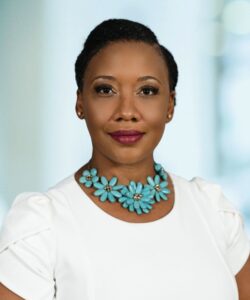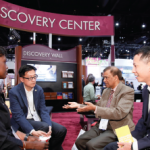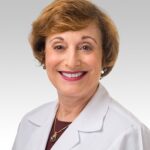Throughout her medical training, Noelle A. Rolle, MBBS, encountered many patients who were struggling not only with rheumatic disease, but with issues of health equity and access to care. This is one of the many reasons she was drawn to rheumatology.

Dr. Rolle
Dr. Rolle, assistant professor in the Division of Rheumatology and associate program director of the rheumatology fellowship, Medical College of Georgia, Augusta University, was born and raised in the Bahamas. While in medical school at the University of West Indies in Jamaica, she recalls being profoundly affected by young women who were diagnosed with lupus but had limited access to the comprehensive care that could be afforded by a rheumatologist. As a resident at Harlem Hospital, New York City, many of her patients did not have access to care for a variety of reasons, and social workers played a key role in their management. During her fellowship at the University of New Mexico, Dr. Rolle saw many Native American patients with severe illness whose disease course was advanced due to delays in access to care. After graduating, she worked in rural Georgia, where she saw firsthand the day-to-day struggles patients and community health providers faced due to limited access to rheumatologists.
These experiences attracted Dr. Rolle to volunteering and the ACR’s Collaborative Initiatives Committee (COIN). As a fellow, she previously served as a member and chair of the Fellow-in-Training Subcommittee of the Committee on Training & Workforce Issues. After serving as a member of COIN for the past three years, she has just begun a term as chair. She spoke with The Rheumatologist to discuss this exciting next step.
The Rheumatologist (TR): As you begin your term as chair of COIN, what goals will you be emphasizing?
Dr. Rolle: There are three main things that I want to do. One of them is to promote COIN and the work that’s been done thus far. There are a lot of people practicing rheumatology in underserved communities who could really benefit from the resources and support we offer. I also think there are members who would gladly volunteer in our initiatives if they were made aware of the opportunities available to them.
Second, as the third chair of this committee, I’m following in the footsteps of two stellar leaders and mentors—Sam Lim, MD, and Rosalind Ramsey-Goldman, MD. They’ve done an excellent job in establishing COIN and helping it flourish. I plan to continue that work alongside our hardworking staff and committee members, working to enhance our current projects and collaborate with other stakeholders—internal and external—to establish new projects aimed at improving rheumatic health equity.
Lastly, I hope to bring about inclusion and be a conduit to amplify the voices of those we don’t traditionally hear from. For the last year, I’ve been the chair of the CARE Vision Task Force, and one of the things I’m most proud of has been the diversity of the rheumatology providers that we asked to join us at the table: senior, early-career, researchers, educators, pediatric, community, academicians, APPs, fellows. Every member of that task force brought a fresh, interesting perspective to the task at hand and our final product was made that much richer due to the diverse points of view, experiences and backgrounds. The ACR should be a place where we all can contribute, even if our views differ, and I want to bring that to COIN.
TR: Could you enumerate some of COIN’s projects that are lined up?
Dr. Rolle: We have several amazing projects that we’ll be continuing. One is a focus on bringing rheumatology to underserved Native American populations. It’s an ECHO project in which rheumatologists give telemedicine grand rounds to train family and internal medicine providers where no rheumatologist is available. I participated in a similar program as a fellow and found it quite rewarding.
A second project is a virtual symposium that addresses ways to advance diversity in clinical trials, and a third is hosting trainings for primary care providers, OB/GYNs and pediatricians for uninsured or underinsured patients with rheumatic disease via the non-specialist physician education initiative.
In these efforts, Starla Blanks, Sheryl McCalla and the rest of the COIN team have worked tirelessly to advance the committee’s mandate. I’ve enjoyed working with them and glad I’m able to continue doing so for the next three years.
TR: What other involvement have you had with the ACR?
Dr. Rolle: Besides the aforementioned, I’ve worked as the chair of the Image Library Diversity Task Force, which was given the mandate to increase the images of people of color in the ACR Image Library. When Ellen M. Gravallese, MD, was ACR President in 2020, she set a mandate to make diversity, equity & inclusion (DEI) a part of the ACR’s mission across all standing committees. At that time, two studies pointed out that medical education had a dearth of images of disease in people of color, which was directly contributing to delays in diagnosis and further widening the health disparity gap. This task force was one of the ways the ACR chose to combat this. I’ve also had the honor to work on the Annual Meeting Planning Committee for the last two years, co-chairing the Review Course, which has always been one of my favorite sessions as a clinician educator.
TR: In addition to your busy professional duties, are there activities you enjoy in your free time?
Dr. Rolle: I love CrossFit and particularly lifting heavy weights! The deadlift is my favorite and I have a PR lift of 285 pounds. I also love to read, travel, visit my family in the Bahamas and go to the theater and concerts. I’ve come to appreciate how much balance enhances your life. It’s a major key.
Gretchen Henkel is a health and medical journalist based in California.


